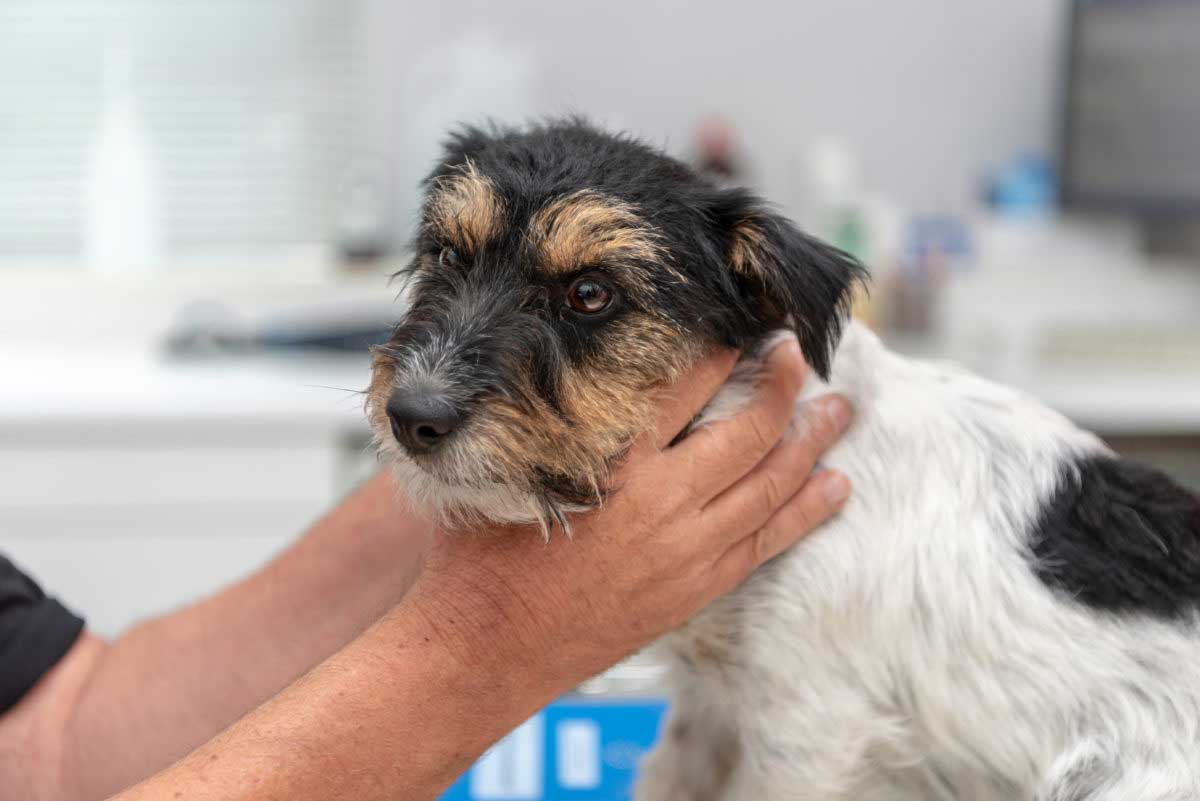Feeding an Elderly Dog: How a Dog's Dietary Requirements Change With Age
July 24, 2019 | By Richard Cross, TheDogClinic.com

Just like us, our dogs can face some big challenges as they grow older but with some careful changes to your senior dog's diet, these challenges can be alleviated or sometimes negated all together.
In this article, we'll discuss five ways a dog's dietary requirements change with age and by the end, you should feel more confident in meeting your senior dog's nutritional needs.
But before we go any further, it's important to understand that canine nutrition is a complex topic. Your senior dog's diet should be discussed with a vet, as his age, weight, health conditions and preferences can all affect what he should eat.
When is a Dog Considered Elderly?
There's no strictly defined age when a dog changes from "adult" to "senior." The age varies depending on the dog's size, weight and health.
Big dogs tend to live shorter lives, so they are often considered senior at around 6-years old. Small breeds may not be senior dogs until they are 9-years old.
Size isn't the only factor though. From a medical viewpoint, a dog might not be considered senior until he starts showing symptoms of aging. These include a change in weight, vision problems, or joint pain.
The dog's weight also plays an important role. Overweight or obese dogs age more quickly, so are likely to be considered senior at a younger age.
1. Older Dogs Need Fewer Calories
One of the most important changes to a senior dog's diet isn't related to the type of food, but the quantity.
A dog's metabolism slows with age. This means the body burns fewer calories and needs less food to function. Many senior dogs are also less energetic, so they burn even fewer calories.
As excess calories are converted into fat, a slower metabolism is one of the main reasons why older dogs tend to become overweight. Weight gain can reduce your dog's expected lifespan, increase joint pain, and generally make your dog less healthy.
It's essential that you limit your pet's food intake to maintain a healthy weight, either by using a low-calorie senior dog food or reducing your pet's daily meals. If you're not sure how to adjust your dog's diet, take a look at our guide or ask your vet for advice.
You don't want to underfeed your dog either, though. Too few calories can cause muscle loss, which may reduce mobility and make joints unstable. For this reason, you should closely monitor your dog's weight and adjust his diet to maintain a healthy weight.
Exercise is beyond the scope of this article, but is another important consideration. Older dogs need less intense exercise, but should still have daily walks to help support muscle condition, provide mental stimulation and maintain a healthy weight.
2. Older Dogs May Need More Protein
Maintaining muscle mass is vital for your dog's health as he gets older. It's important to provide your dog with enough protein, as his body may become less effective at synthesising protein with age.
This is why senior dog foods often contain higher quality protein sources. Meat and fish tend to be the easiest sources to digest, although some newer foods use insect protein. Cheaper protein sources, such as potato and soya, may be more difficult to digest.
There needs to be a balance when increasing protein though. Too much protein can put pressure on the kidneys - especially if your dog has kidney problems.
3. Dogs With Health Conditions May Need Special Diets
There are many senior dog foods on the market. These may be suitable for healthy dogs that are just getting older - but they are not designed for dogs with health problems.
If your dog has a health condition, you may need to adjust his diet to provide the nutrients he needs. You should always ask a vet for advice, but here are some common examples:

- Diabetes: It's essential that a dog with diabetes remains lean and slim, as weight gain makes it harder for the body to use insulin effectively. Most importantly, you should try to keep your dog's blood sugar levels as stable as possible. A diet that's high in fibre is usually recommended, as this causes food to be absorbed more slowly.
- Heart Disease: The correct diet can slow down or even resolve heart disease. Aside from maintaining a healthy weight, you should limit your dog's sodium intake. Be particularly careful with treats, as these often contain large amounts of salt. Supplementing with taurine and omega-3 fatty acids may also help.
- Kidney problems: As a general rule, dogs with kidney disease should be fed a diet with limited amounts of sodium and protein. The kidneys play a crucial role in synthesising protein, so too much can cause excessive strain. It's also vital to reduce the amount of phosphorous in your pet's diet, as this seems to be linked to a higher risk of kidney disease progression.
- Osteoarthritis: Omega-3 fatty acids are important for dogs that have arthritis. Some foods also contain chondroitin and glucosamine, which support joint cartilage, although you'll usually need to supplement these separately to get the correct amounts. The most important thing for a dog with arthritis is to maintain a healthy weight, as even a few extra pounds can increase pressure on joints.
On a related note, make sure you take into account your dog's teeth when choosing a food. Hard kibble is uncomfortable to eat for a dog with poor or missing teeth.
4. Some Older Dogs May Benefit From Supplementation
There is a wide range of supplements marketed for senior dogs. While some of these are certainly beneficial, many have little or no scientific backing.
With that said, there are several that you may want to consider. For dogs with joint pain, glucosamine and chondroitin can be very effective at supporting healthy cartilage. These supplements aren't going to eliminate pain, but they can help manage your pet's discomfort. The herb devil's Claw can also do wonders for a lot of dogs with joint problems.
Other supplements may slow cognitive decline. DHA, which is an omega-3 fatty acid, is one of the most widely recommended examples. Medium-chain triglycerides (MCTs) are another type of fat that may provide certain health benefits, such as improved cognitive function.
5. Older Dogs May Need More Encouragement to Eat
It's normal for dogs to eat less as they get older, but they should still have a healthy appetite.
If your dog is eating a lot less than normal, or refuses to eat at all, this could be a sign of an underlying medical problem. Kidney disease, diabetes, cancer or dental problems can all affect your dog's appetite, so you should visit a vet as soon as possible for a diagnosis.
Once serious causes have been ruled out, there are a few things you can do to make food more appealing to a senior dog. These include:
- Try to make your dog's food more palatable, as senior dogs can be fussier about what they eat - often due to a reduced sense of taste. Adding cooked chicken is an easy example, although make sure you don't accidentally overfeed.
- If you're using dry kibble, try mixing it with warm water to make it softer and more appetising. Low-sodium chicken broth can be even more appealing.
- Multiple smaller meals throughout the day may be easier for your dog to digest than one or two large meals.
- If your dog is suffering from joint pain, discuss pain medication with your vet. It can be difficult for a dog to feel like eating if they are in pain.
- Some types of medication can affect a dog's appetite. If you think this might be the reason for your pet eating less, discuss alternative medications with your vet.
- Older dogs sometimes find it difficult to eat from bowls on the floor. Consider getting an elevated dish, so that your pet doesn't need to bend his neck so much to eat.
Summary
Every dog has slightly different dietary requirements, so you should always discuss your senior pet's food with a vet.
As a general rule, older dogs generally benefit from fewer calories (a lower calorie food or just smaller meals) and a good supply of quality protein. They may also need a diet that accounts for medical conditions and possibly more appetising meals as well as supplements to help them cope with the natural challenges that come with ageing.
About the author
 Richard is a dog expert and editor of The Dog Clinic. His goal is to help dog parents build strong, kind and tolerant relationships with their pets through positive training and a deeper understanding of canine behaviour. Richard is a dog expert and editor of The Dog Clinic. His goal is to help dog parents build strong, kind and tolerant relationships with their pets through positive training and a deeper understanding of canine behaviour.
|
glamlinks •8 months ago
Great article! For those looking for more comprehensive information on health, wellness tips, and expert advice, check out AllAboutHealthInfo.com. It’s a fantastic resource with up-to-date articles on various health topics, from nutrition to fitness and mental well-being. Highly recommend!